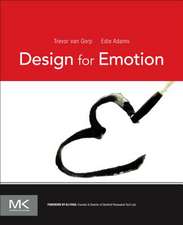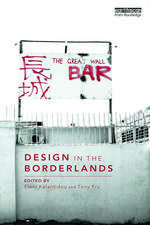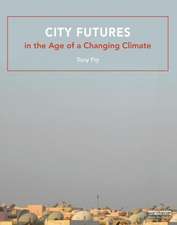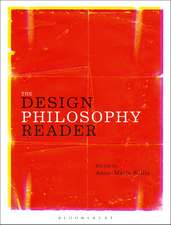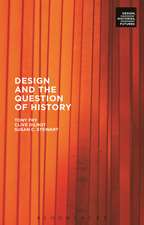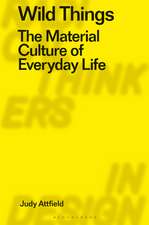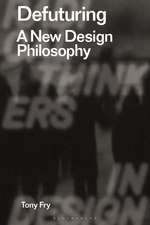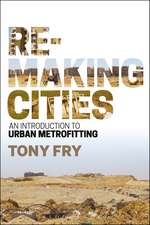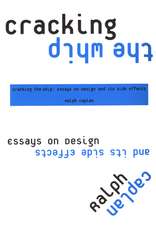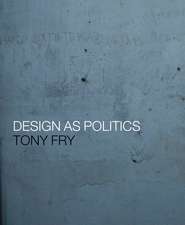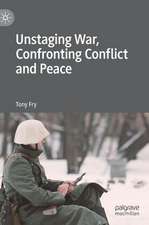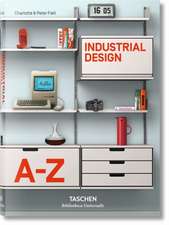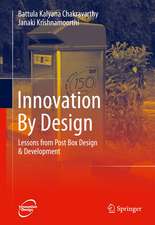Steel: A Design, Cultural and Ecological History: Design, Histories, Futures
Autor Tony Fry, Professor Anne-Marie Willisen Limba Engleză Paperback – 28 ian 2015
| Toate formatele și edițiile | Preț | Express |
|---|---|---|
| Paperback (1) | 198.68 lei 3-5 săpt. | |
| Bloomsbury Publishing – 28 ian 2015 | 198.68 lei 3-5 săpt. | |
| Hardback (1) | 772.74 lei 6-8 săpt. | |
| Bloomsbury Publishing – 28 ian 2015 | 772.74 lei 6-8 săpt. |
Preț: 198.68 lei
Preț vechi: 230.69 lei
-14% Nou
Puncte Express: 298
Preț estimativ în valută:
38.02€ • 39.69$ • 31.46£
38.02€ • 39.69$ • 31.46£
Carte disponibilă
Livrare economică 15-29 martie
Preluare comenzi: 021 569.72.76
Specificații
ISBN-13: 9780857854803
ISBN-10: 0857854801
Pagini: 272
Ilustrații: 31 bw illus
Dimensiuni: 138 x 216 x 15 mm
Greutate: 0.39 kg
Editura: Bloomsbury Publishing
Colecția Bloomsbury Academic
Seria Design, Histories, Futures
Locul publicării:London, United Kingdom
ISBN-10: 0857854801
Pagini: 272
Ilustrații: 31 bw illus
Dimensiuni: 138 x 216 x 15 mm
Greutate: 0.39 kg
Editura: Bloomsbury Publishing
Colecția Bloomsbury Academic
Seria Design, Histories, Futures
Locul publicării:London, United Kingdom
Caracteristici
A timely project, given the rise of environmental and sustainability agenda, and a valuable contribution to the design-futures debate
Notă biografică
Anne-Marie Willis is a design writer, editor, and educator, and currently professor of design theory at the German University in Cairo. She is editor of the international refereed journal, Design Philosophy Papers and is the author of many papers, articles and three major books.Tony Fry is professor of design, Design Futures Program, QCA, Griffith University, Australia. Tony has published nine books, most recently Design as Politics, Bloomsbury Academic (2011), has chapter/essays in twenty, and has authored approximately 200 articles and conference papers. He has lectured in many universities in Australia, North and South America, Asia and Europe, has consulted to industry (including the steel industry) and has been a member of many design teams.
Cuprins
IntroductionPart 1- The Ages of Iron Chapter 1. Traffic in IdeasChapter 2. Ecologies of CarbonChapter 3. Magic, Alchemy and SciencePart 2 - The Ages of IndustryChapter 4. The Proto-ModernChapter 5. Fully Mechanised ModernityChapter 6. Technology After the ModernPart 3 - Towards the Ages of Sustainment Chapter 7. Environments of Iron and Steel-making Chapter 8. Regulating Industrial EnvironmentsChapter 9. Futuring: Sustainment by DesignBibliographyIndex
Recenzii
Tony Fry (Queensland College of Art, Australia), one of the world's leading experts on the theory of design and its impact on culture, and Anne-Marie Willis (design theory, German Univ., Egypt) have produced an exceptional piece of scholarship with Steel: A Design, Cultural, and Ecological History. The book is part of a series called "Design, Histories, Futures," which 'aims to advance knowledge on the wider historical significance of design.' This work defies easy categorization: it is part history, part historiography, part ecological philosophy, and part design theory. All parts, however, are tied seamlessly together under one conceptual umbrella-the history of steel (and iron) production and the past, present, and future effects these materials have had (and will continue to have) on the world. Fry and Willis also pay close attention to the question of sustainability as they trace the social and economic histories of steel in various cultures, both Western and non-Western. This carefully documented study will be an excellent source for all historians of technology and for specialists in ecological and design studies. Summing Up: Highly recommended. Graduate students, researchers/faculty, and professionals/practitioners.
The work offers insight into the embedded complexities of the sustainability agenda, via historical consideration of one material - steel. This provides a vehicle for addressing the ways in which humans have historically conceived of and produced their world. It goes beyond conventional commodity histories, in addressing the philosophical conditions in which the production and consumption of steel originates.
The work offers insight into the embedded complexities of the sustainability agenda, via historical consideration of one material - steel. This provides a vehicle for addressing the ways in which humans have historically conceived of and produced their world. It goes beyond conventional commodity histories, in addressing the philosophical conditions in which the production and consumption of steel originates.


